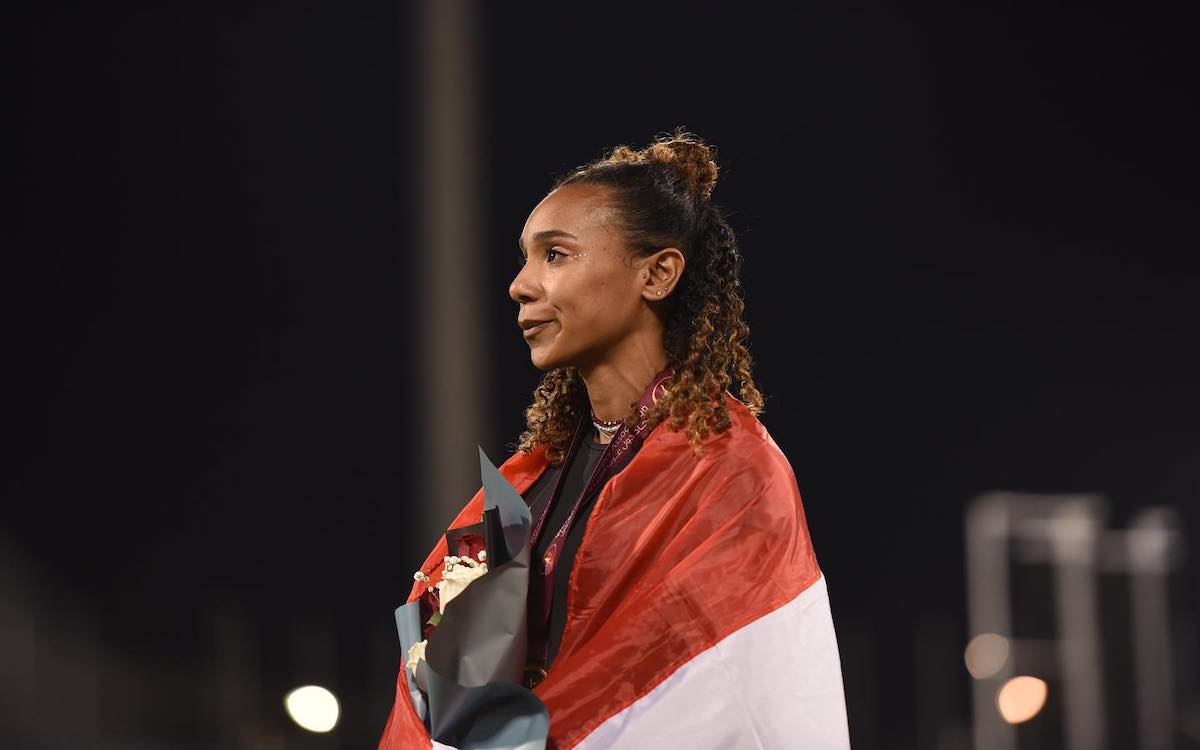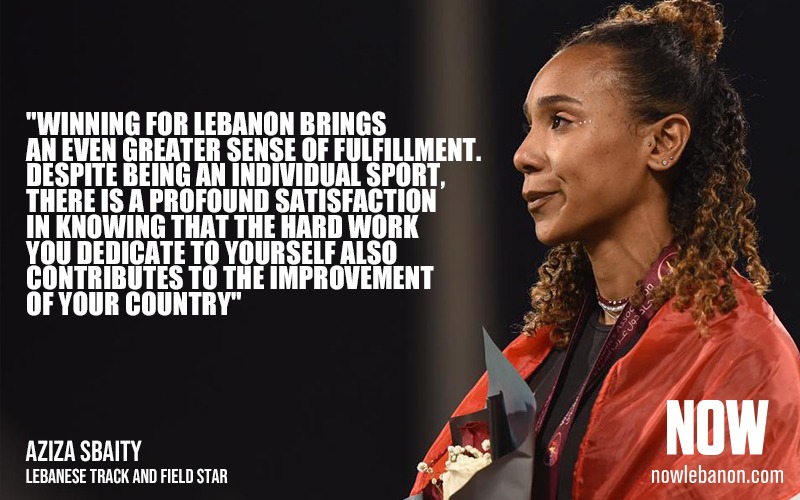
Overwhelmed with emotion, a Lebanese flag draped atop her head, Aziza Sbaity beamed with pride at the 2023 Arab Athletics Championships. The sprinter took home gold in the 200m race and added silver to her haul for the 100m event – she was Lebanon’s only gold medalist at the games.
Lebanon’s female athletes earned five medals at the competition, with Aziza Sbaity taking two and Rasha Badrani and Joan Makary each earning one. Another silver medal was awarded to Tala Fakhoury, Nada El Kurdi, Joan Makary and Rasha Badrani for their performance in the 4x400m race.
Amidst the economic hardship Lebanon has been facing for over four years, Sbaity remains determined to fulfill her Olympic dream, which was delayed due to the COVID-19 pandemic. Reflecting on competing in 2024, she expressed her excitement for representing Lebanon saying, “It’s a beautiful feeling wearing my country’s colors and feeling proud of it,” she told NOW with enthusiasm.
Despite the physical conditions and psychological obstacles that stood in her way, Sbaity managed to persevere, using only her inner strength as fuel. Her accomplishments have ignited a glimmer of hope for those in the athletic realm and beyond during Lebanon’s worsening economic crisis: the value of its currency has decreased dramatically, about 90 percent since 2019, while inflation rates are ever-growing and unemployment has skyrocketed up to 29.6 percent since January 2022.
The early years
From a young age, Sbaity experienced life in two very different countries. Born to a Liberian mother and Lebanese father, her childhood was spent in Liberia on the western coast of Africa. When she reached the sixth grade, her family moved to Lebanon.
As a child, she was quite a tomboy and loved to play sports. She shared that she was constantly covered in scratches and bruises from playing too much. At her new Lebanese school – International School of Choueifat – she tried out for track and field, where she discovered how quickly she could move.
“That’s when it all came together for me,” she recalled.
“My skillset impressed my coaches, so they invested in me and hired a football coach to work with me on improving,” she stated. Her school had a widespread presence throughout the Arab world, and held regional championships which she would qualify for and manage to win.
Though she had not been training extensively, it was her trainers that eventually encouraged her to pursue tracking on a more competitive level and brought the Jamhour Club to her attention. Following their advice, she decided to take on serious training one year before graduating high school. It was at the Lebanese national championships that same year that she saw her hard work pay off.
She was then selected to represent the nation at the Jeux de la Francophonie (6th Francophone Games) in 2009. The event, held from September 27 to October 6 in Beirut, was an international multi-sport affair that attracted participants from across the globe.
Once she was selected for Lebanon’s national team, the journey of a lifetime started and developed an enormous appreciation and enthusiasm for the sport and its participants. In order to pursue this further, during her first year of university, training with Jamhour became an integral part of her daily life and marked the commencement of her track career.
The unfolding of the journey
Though people of African origins are not uncommon in Lebanon, racism and racial discrimination remain issues of serious concern. This is evidenced by the fact that tourist resorts deny African visitors access to their swimming pools. It appears that people with darker skin tones are thought to inhabit Lebanon solely to fulfill the roles of servitude.
Right from a tender age, Sbaity faced the brunt of racism at school. She was taunted for her dark complexion by children, which she said were merely influenced by a racist society at large.
“In Lebanon, racism exists and is experienced by many dark-skinned people living in the nation. Despite those who tell me this issue should not be discussed, I am determined to use my platform to call attention to it,” Sbaity said.
The athlete recounts an instance at the airport, where she was left humiliated by security when they requested her to join the “domestic workers” line and mocked her for having a Lebanese passport. Enraged by such behavior, Sbaity exclaimed “What difference does it make what my race is or what passport I possess? There’s no justification for people to discriminate based on skin color.”
Throughout it all, Sbaity stood tall, claiming that the people around her – family, friends and fellow track members – kept her motivated. She resolved not to allow racial prejudice to color her experiences for good, knowing it was a brief chapter in her life that has now passed.
“In my athletic community, we’re all equal,” she said. “No one is judged differently.”

A vision of success
When she is not focused on training, maintaining a healthy diet, and ensuring she gets ample rest, Sbaity dedicates a significant portion of her time to conducting research for her master’s degree in Olympic Studies and Sports Policies.
Through her studies, Sbaity delves into the captivating history of Lebanese Olympians, who often remain unrecognized to this day. Lebanon made its Olympic debut in 1948, although its initial attendance dates back to the 1936 Berlin Olympics when a delegation of officials represented the country. Lebanon has yet to secure a gold medal at the Olympics. However, Lebanese athletes have achieved four medals, consisting of two bronze and two silver medals in Greco-Roman wrestling and weightlifting.
“People may know about me through social media, but what about those who came before me and remain unheard of?” Sbaity pondered, acknowledging the lack of awareness surrounding the achievements of previous athletes.
While Sbaity’s mother currently resides in the United States, Sbaity has consciously chosen to remain in Lebanon, recognizing the potential opportunities the country holds for her future. However, she acknowledges that this may not hold true for many others who opt to immigrate.
As of 2023, Lebanon’s net migration rate stands at -24.568 per 1000 population, indicating a 19.53 percent increase compared to 2022. The previous year, in 2022, the net migration rate for Lebanon was -20.553 per 1000 population, demonstrating a 24.28 percent rise from 2021.
Ups and downs
Sbaity encountered various challenges along her journey, navigating through obstacles that tested her resilience. Last year proved to be a period of uncertainty as she sought to find her true direction.
Despite her efforts, she fell short of reaching her personal best, and the impressive speed she had achieved in 2021 when she shattered the 100m record. Unfortunately, a change in running shoes in 2022 led to chronic heel pain, which greatly affected her training and performance.
While trying to avoid aggravating her heel, she suffered a fall that resulted in a dislocated shoulder. With limited training opportunities during the off-season, she faced an uphill battle when it came time to compete, struggling to regain her previous form.
“Now that I’m more careful, I take all factors into consideration,” she said. “What I eat, how much rest I get and how much travel I take on.”
Also important was channeling all of her energy into training and having a clear vision of what she wanted to achieve.
“Winning for Lebanon brings an even greater sense of fulfillment. Despite being an individual sport, there is a profound satisfaction in knowing that the hard work you dedicate to yourself also contributes to the improvement of your country,” Sbaity exclaimed.
Dana Hourany is a multimedia journalist with @NOW_leb. She is on Instagram @danahourany and Twitter @danahourany.








